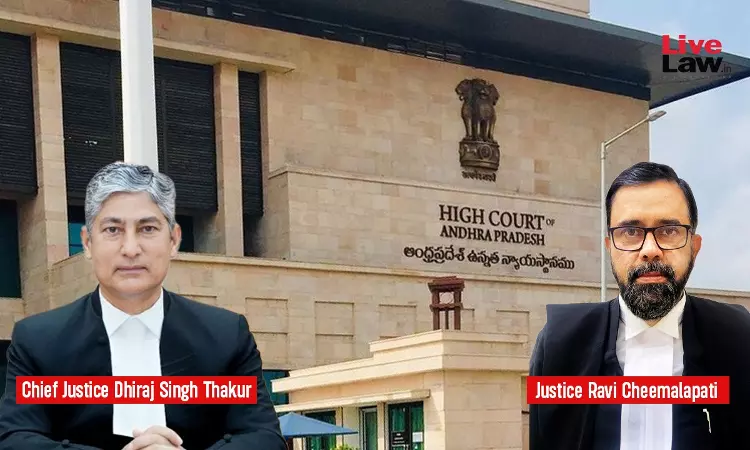- Home
- /
- High Courts
- /
- Andhra Pradesh High Court
- /
- Failure To Furnish Non-Creamy Layer...
Failure To Furnish Non-Creamy Layer Certificate Within Stipulated Time Would Result In Consideration Under General Category: AP High Court
Saahas Arora
6 Jun 2025 6:50 PM IST
The Andhra Pradesh High Court has dismissed a plea of a Civil Judge (Junior Division) applicant, who sought appointment under the BC-E category in the Andhra Pradesh State Judicial Services, and had her candidature rejected on account of non-compliance with eligibility conditions.Following the publication of a recruitment advertisement, the petitioner had submitted her non-creamy...
The Andhra Pradesh High Court has dismissed a plea of a Civil Judge (Junior Division) applicant, who sought appointment under the BC-E category in the Andhra Pradesh State Judicial Services, and had her candidature rejected on account of non-compliance with eligibility conditions.
Following the publication of a recruitment advertisement, the petitioner had submitted her non-creamy layer certificate much after the entire selection process had concluded. In this regard, a Division Bench of Chief Justice Dhiraj Singh Thakur and Justice Ravi Cheemalapati explained,
“According to the advertisement notification, it was made clear to the petitioner and similarly situated others that any applicant who intended to avail the reservation had to upload the non-creamy layer certificate, and in case of failure to upload the same, that the candidate would be considered under the open merit category. The petitioner, therefore, was required to upload the requisite certificate before the last date for application prescribed in the advertisement notification, i.e., 8.12.2022, and therefore, clearly her case could not have been considered in any category except the open category as had clearly been made clear in the said notification.”
Background
The Registrar (Recruitment) of the High Court of Andhra Pradesh (Respondent 2), through an advertised notification dated 10.11.2022, had invited applications from eligible candidates to occupy up to 31 posts of Civil Judges of the Junior Division in the Andhra Pradesh State Judicial Services. Among these seats, one seat was reserved for a candidate belonging to the BC-E category. The applicants who intended to avail/claim reservation under Backward Classes (A, B, C, D & E) had to submit a copy of the latest non-creamy layer certificate issued either in the year 2021 or 2022 and in case of non-submission of the same, they would be considered against Open Category only.
The petitioner had applied for the post under the BC-E category (creamy layer), however, her case was considered under the open merit category as per the advertisement notification. While the petitioner had obtained her non-creamy layer certificate on 19.08.2023 and made a representation to the administrative committee of the High Court on 11.09.2023, requesting her application to be considered under the BC-E (non-creamy layer), the entire process of selection was already completed by 08.08.2023. The representation was rejected by the respondents on the grounds that the petitioner had not satisfied the stipulated conditions of the advertised notification. Aggrieved by the said rejection, the petitioner approached the High Court.
It was the case of the petitioner that her right to be considered under the BC-E category could not be transgressed as even though she had submitted the certificate after the completion of the process of selection, the respondents should have considered her application in as much as there was no delay in producing proof of her belonging to non-creamy layer under the said category.
On the contrary, the respondents reasoned that the petitioner had failed to furnish the requisite non-creamy layer certificate, which was mandatory to be appended to the application form. Additionally, it was also argued that the petitioner had to produce the certificate issued in 2021 or 2022, whereas the produced certificate was issued in 2023.
Court's Findings:
At the outset, the Division Bench examined Clauses IV and V of the advertisement Notification and clarified that the conditions clearly stipulated that the non-creamy layer certificate had to be issued either in the year 2021 or 2022.
Taking this into consideration, the Court held that the petitioner could not be considered under the non-creamy layer at all, as firstly, the petitioner had clearly not applied under the non-creamy layer category, but under the creamy layer category.
Secondly, the Court added that the petitioner could not be considered for the said category as she had applied for the issuance of non-creamy layer certificate on 15.11.2022 after the circulation of the notification dated 10.11.2022 and had obtained the certificate of on 19.08.2023, much after the entire process of selection had been completed by 08.08.2023.
Thirdly, the Court observed that the certificate of non-creamy layer produced was of the year 2023, even though the advertised notification clearly stated that the certificate produced had to be issued in the year 2021-2022.
The Division Bench referred to the ruling of the Supreme Court in Divya v. Union of India [(2024) 1 SCC 448], where it was held that it was mandatory for a candidate to be in possession of all requisite certificates in the prescribed format on the closing date of the application for civil preliminary examinations. Relying on the decision, the Division Bench held,
“In the instant case, similarly, the petitioner was required to upload the non-creamy layer certificate issued either in the year 2021 or 2022, issued in terms of G.O. No. 26, dated 9.12.2013, read with G.O. No. 3, dated 4.4.2006. We are dealing with the crucial issue of determining the eligibility of the petitioner. Failure to do the needful within the time prescribed as per the notification would render her to be considered only under the open category and not under the non-creamy layer category of BC-E.”
Accordingly, the Court dismissed the writ petition.
Case Details
Case Number- W.P. No. 26386 of 2023
Case Name- Bepari Shaik Arshiya Anjum Vs. The High Court Of Andhra Pradesh and Others



